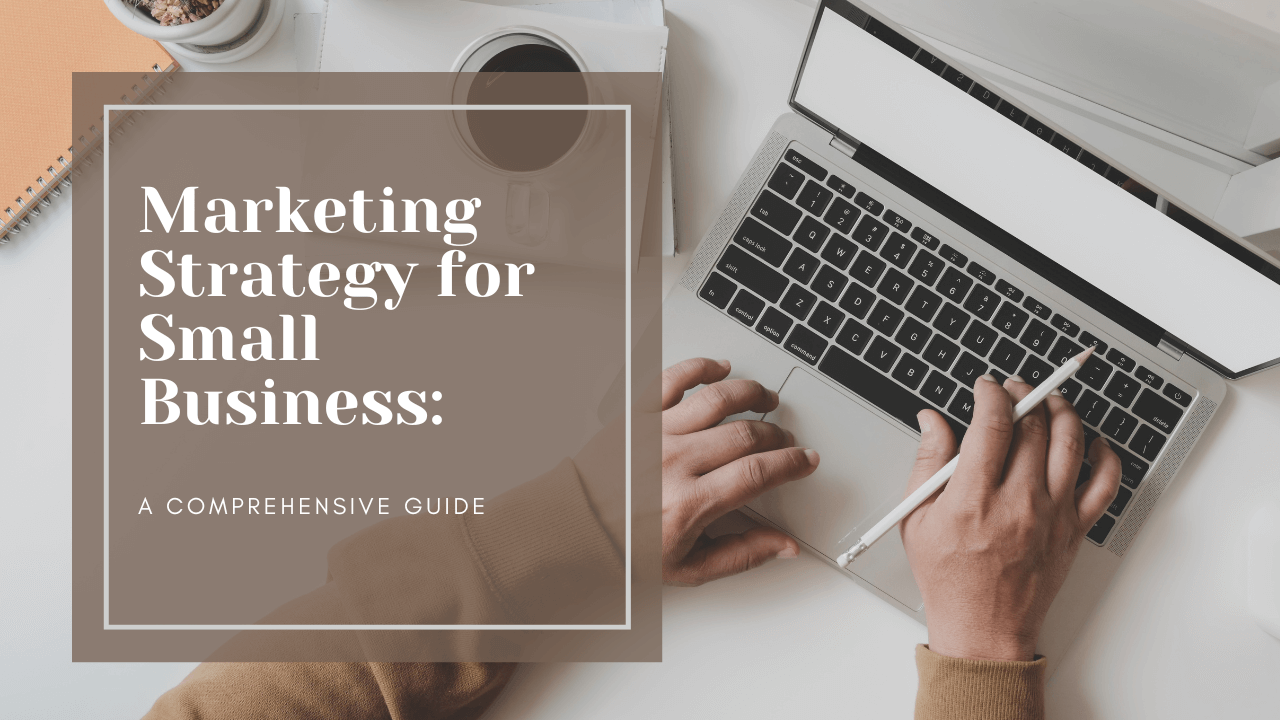Marketing Strategy for Small Business: A Comprehensive Guide

Introduction
Running a small business can feel like juggling too many tasks at once. From managing finances to building relationships with customers, it's easy to let marketing fall by the wayside. But here's the truth: without a solid marketing strategy, your business might struggle to grow consistently. A marketing strategy isn’t just for big corporations—it’s your roadmap to success. It helps you reach the right people, make informed decisions, and ultimately grow your business.
In this guide, we’ll break down everything you need to know about creating an effective marketing strategy, tailored to small businesses. Whether you're working with a tight budget or you're new to marketing, we’ve got actionable tips and real-world examples to help you out.
Key Takeaways
-
A marketing strategy is essential for reaching your audience, saving time, and growing your business.
-
It’s not the same as a marketing plan—your strategy defines the "why," while the plan focuses on the "how."
-
With a clear strategy, you can market effectively on a small budget and track your success with measurable goals.
-
Whether you’re managing marketing in-house or hiring an agency, this guide will help you get started.
Table of Contents
-
What is a Marketing Strategy, and Why Do I Need One for My Business?
-
Marketing Strategy vs. Marketing Plan: What’s the Difference?
-
How Do I Start Creating a Marketing Plan for My Small Business?
-
Do I Need to Hire an Agency, or Can I Manage Marketing In-House?
-
Can I Just Copy What My Competitors Are Doing for My Marketing?
-
What’s the Difference Between Marketing and Sales, and How Do They Work Together?
-
Do I Need a Marketing Strategy if I Already Have Word-of-Mouth Customers?
What is a Marketing Strategy, and Why Do I Need One for My Business?
A marketing strategy is your game plan for reaching and connecting with your ideal customers. Think of it as your business’s north star—guiding every decision you make about promoting your products or services. For small businesses, having a strategy isn’t just helpful; it’s crucial. Here’s why:
-
Saves Time and Effort: Instead of scrambling for ideas, a strategy helps you focus on what works.
-
Provides Direction: You’ll always know what to do next.
-
Maximizes Your Budget: You can prioritize the most cost-effective channels.
-
Drives Growth: By consistently reaching the right audience, you can expand your customer base.
Example: Imagine you run a small bakery. Without a strategy, you might post random pictures on Instagram or rely solely on foot traffic. But with a strategy, you can identify that your target audience is young professionals who prefer online ordering. You might then focus on building a sleek website and promoting it through local food influencers.
Marketing Strategy vs. Marketing Plan: What’s the Difference?
It’s easy to confuse these terms, but they play different roles:
-
Marketing Strategy: The "big picture" approach. It defines your goals, audience, and value proposition.
-
Marketing Plan: The detailed playbook. It lays out specific tactics, timelines, and budgets to achieve your strategy.
Example: If your strategy is to increase brand awareness among eco-conscious shoppers, your plan might include starting a blog about sustainability and running Facebook ads targeting people interested in green living.
How Do I Start Creating a Marketing Plan for My Small Business?
Starting from scratch? Here’s a step-by-step process:
-
Understand Your Audience: Who are your customers? What do they need, and where do they hang out online?
-
Example: If you own a pet grooming service, your audience might be pet owners in your local area who value convenience and care.
-
-
Set SMART Goals: Specific, Measurable, Achievable, Relevant, and Time-bound.
-
Example: "Increase website traffic by 20% in the next three months" is more actionable than "get more visitors."
-
-
Analyze Your Competition: What are similar businesses doing? Learn from their strengths and avoid their weaknesses.
-
Choose Your Channels: Focus on platforms your audience uses most.
-
Example: If you’re targeting young adults, TikTok and Instagram might be better options than LinkedIn.
-
-
Budget Wisely: Identify where to spend your limited resources for maximum impact.
-
Track and Adjust: Use data to see what works and tweak your approach.
Essential Components of a Marketing Strategy
Every great marketing strategy includes these elements:
-
Target Audience: A clear understanding of who you’re trying to reach.
-
Unique Value Proposition (UVP): What makes your business special? Why should customers choose you?
-
Marketing Goals: What are you trying to achieve? More sales, better engagement, or something else?
-
Brand Messaging: Consistent and compelling communication that connects with your audience.
-
Channel Strategy: The mix of online and offline platforms where you’ll market your business.
-
Performance Metrics: Clear ways to measure success, like website visits, social media engagement, or sales growth.
How Can I Market My Business on a Small Budget?
Small budget? No problem. Here are some creative ways to get your business noticed without overspending:
-
Social Media Magic: Post consistently on platforms like Instagram, Facebook, or LinkedIn. Share stories, tips, or behind-the-scenes moments.
-
Example: A local coffee shop could post daily specials and feature customer reviews.
-
-
SEO for the Win: Optimize your website so it shows up when people search for businesses like yours.
-
Email Marketing: Stay in touch with your audience by sending newsletters, special offers, or updates.
-
Example: A boutique clothing store could send out an email showcasing new arrivals.
-
-
Partner Locally: Collaborate with other small businesses for mutual promotion.
-
Example: A fitness studio might team up with a nearby juice bar for a joint discount.
-
-
DIY Content Creation: Use free tools like Canva to create professional-looking graphics.
How Can I Measure the Success of My Marketing Efforts?
Tracking results is key to understanding what works. Here are some important metrics:
-
Website Traffic: Use tools like Google Analytics to see how many people visit your site.
-
Conversion Rates: Measure how many visitors take action, like signing up for a newsletter or making a purchase.
-
Customer Retention: Track how many customers return for repeat business.
-
Social Media Engagement: Keep an eye on likes, comments, shares, and clicks.
-
ROI: Compare the cost of your marketing efforts to the revenue they generate.
Do I Need to Hire an Agency, or Can I Manage Marketing In-House?
This depends on your business’s size, budget, and expertise:
-
Hire an Agency: Ideal if you lack time or experience. Agencies bring expertise and can scale your efforts.
-
In-House Management: Great for tight budgets. You can learn the basics using online resources and free tools.
Can I Just Copy What My Competitors Are Doing for My Marketing?
It’s tempting, but copying isn’t a winning strategy. Your business is unique, and your marketing should reflect that. Instead of mimicking others, focus on:
-
Highlighting what sets you apart.
-
Adapting ideas to fit your audience.
-
Avoiding legal or ethical risks.
What’s the Difference Between Marketing and Sales, and How Do They Work Together?
-
Marketing: Focuses on building awareness and attracting leads.
-
Sales: Converts those leads into paying customers.
Both teams should collaborate closely. For example, if marketing notices a social media campaign is driving a lot of interest, sales can prepare to follow up with those leads.
Do I Need a Marketing Strategy if I Already Have Word-of-Mouth Customers?
Yes! Word-of-mouth is fantastic, but it’s not enough to scale your business. A strategy helps you:
-
Reach a broader audience.
-
Build a consistent and professional brand image.
-
Adapt to changes in the market.
Conclusion
A solid marketing strategy isn’t a luxury; it’s a necessity for small business success. By understanding your audience, setting clear goals, and leveraging cost-effective tools, you can build a plan that delivers real results.
FAQs
-
What is the most cost-effective way to market a small business? Focus on social media, email campaigns, and SEO to maximize reach with minimal investment.
-
How often should I update my marketing strategy? Revisit your strategy quarterly or whenever there are significant market changes.
-
What tools can help with small business marketing? Use platforms like Google Analytics, Mailchimp, and Canva to streamline efforts.
-
Can I market my business without a website? While possible, a website adds credibility and serves as a hub for all your marketing efforts.
-
What is the biggest marketing mistake small businesses make? Neglecting to define their target audience, leading to wasted resources and missed opportunities.
Download our free Marketing Strategy Template and create a powerful plan to grow your business! Perfect for business owners, this easy-to-use template is your key to success.


